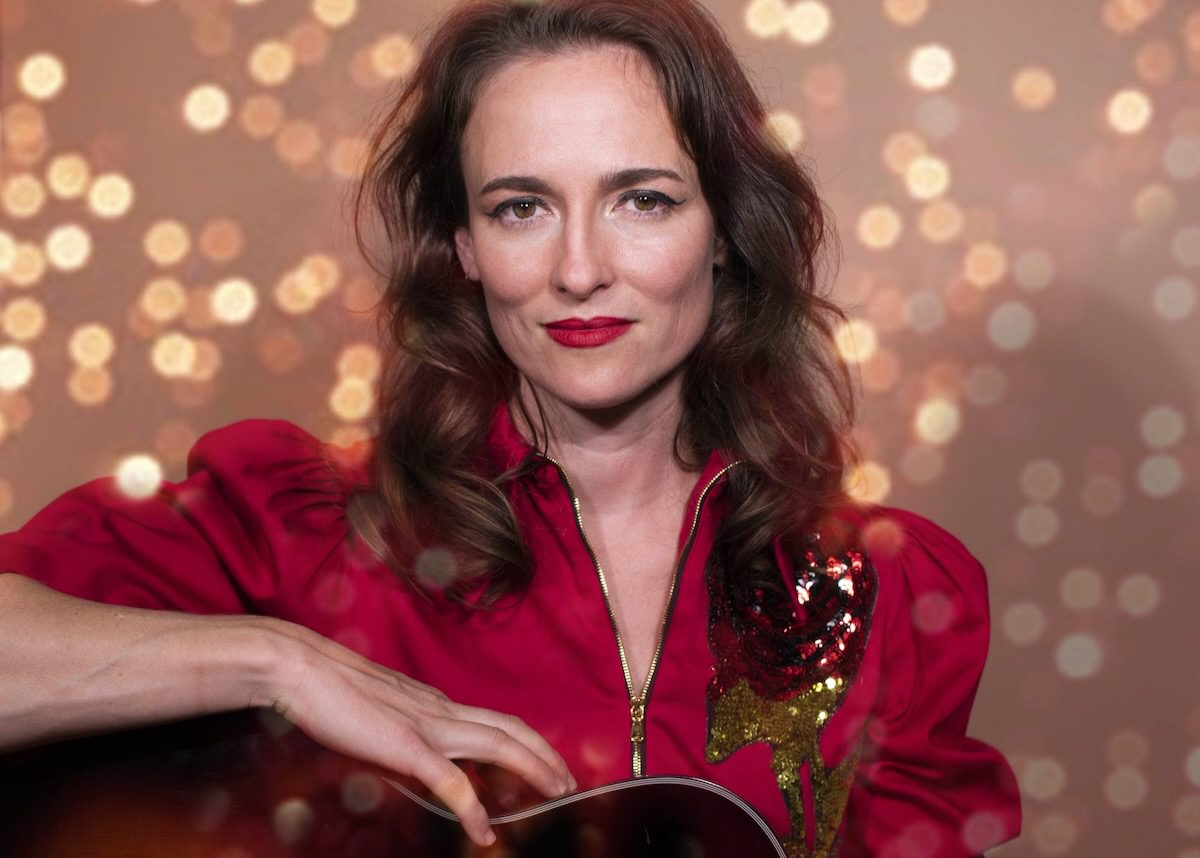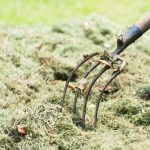Despairing Over Erosion of Women’s Rights, Dawn Landes Finds Sisterhood in a Songbook

Dawn Landes (photo by Heather Evans Smith)
On the hot summer night that word of the Supreme Court’s impending decision on the Dobbs case leaked, Dawn Landes found herself unable to sleep.
The 2022 decision in Dobbs vs. Jackson Women’s Health Organization overturned Roe vs. Wade and its longstanding protections of the right of women to choose safe, legal abortion. It was the first time in America’s history that the court had acted to revoke a right, and it felt like the beginning of a backslide.
Landes felt that hope was out of reach, and maybe change was, too. But then she turned to her bookshelf.
Sitting there, as if waiting for its moment for rediscovery, was a 1971 paperback titled The Liberated Woman’s Songbook — its cover text vivid white and yellow against a black background.
“[The Dobbs decision] just hit me like a ton of bricks,” Landes says from her home in Chapel Hill, North Carolina. “And it was after that I realized I was grasping for something. I needed something to hold onto. And I just grabbed that book, and I was like, ‘Is this my life raft?’”
For many months to follow, it was — and still is. Landes dove headlong into the book, learning and researching its songs and going down a rabbit hole of other songs sung throughout modern history with the aim of changing women’s lives. First, she presented the songs via a few spirited performances, including one at last year’s Newport Folk Festival, and now she’s collected 11 of them into an album, also titled The Liberated Woman’s Songbook, out this Friday.
“I do get a sense of joy and a sense of sisterhood and a sense of action when I perform these songs,” Landes says. “It really moves people, and I think hopefully lights a fire and connects them to history. Also, people learn something from it. I think that’s really important. Music is entertainment, but I also want it to teach something. Because it’s taught me a lot. I’ve learned so much from this project.”
Beyond the Picket Line
The Liberated Woman’s Songbook was published by Jerry Silverman in 1971, two years before Roe vs. Wade.
Silverman is a folksinger, guitar instructor, and musicologist who has authored more than 200 books, including The Folk Song Encyclopedia and The Folksinger’s Guitar Guide. Most of his publications collect songs based on a theme, such as Ballads and Songs of the Civil War, The Baseball Songbook, and The Undying Flame: Ballads and Songs of the Holocaust. Through his work as an editor of Sing Out! magazine, Silverman met and befriended Pete Seeger, who over his career recorded many of the songs in The Liberated Woman’s Songbook.
Five lines of yellow text on the book’s cover describe the contents: “Seventy-seven singable folk songs about women and their battles with husbands, lovers, the devil, the system … and themselves. With lyrics, guitar arrangements, and entertaining photographs.” One such photograph appears on the cover, framed in the pot of a red banjo shape that also hints at both the male and female symbols (♀and ♂). It’s a woman in sunglasses shouting and pointing toward the reader. The cover price was $3.95.
Considering these songs against a modern backdrop, both politically and musically, Landes wanted to give them an update. She worked with producer Josh Kaufman — well acquainted with the concept of updating old songs through his work with Bonny Light Horseman — to expand the songs and bring them to new ears.
“I wanted people to listen to it and relate it to their lives today, all the while knowing this comes from the past, but without having to question it and be like, ‘What does the word “hence” mean again?’ ‘What does “grog shop” mean?’”
In the Songbook itself, like in most songbooks, only the melody line is offered in musical notation, along with chords and lyrics. Landes and Kaufman expanded the songs into a full-band treatment, and in many cases added choruses where none existed before. Some songs didn’t even have their own melody, instead being sung “to the tune of” well-known songs of their era.
“[Kaufman] said something really interesting about how the songs were never really meant to travel beyond the picket line musically,” Landes recalls. “That’s the thing about protest songs. They’re very repetitive for a reason, because people need to know how to sing them quickly.”
Silverman presents the songs in his Liberated Woman’s Songbook in sections according to theme, including “Songs of Courting, Marriage, and Domestic Life,” “Songs of the Struggle,” and “They Did Their Thing.” For her album, Landes selected the songs she was most drawn to lyrically, which often fell into the “Songs of the Struggle” category. But rather than present her songs by theme, she put them in chronological order, starting with 1830’s “Hard Is the Fortune of All Womankind” and ending with “Liberation, Now!” from 1970.
“I wanted to tell myself a story. I wanted a history. I wanted the songs to teach me something,” Landes says. “If you lay them all out chronologically, then maybe it’ll all make sense, and we’ll all know why we’re here in this present predicament and how to get out of it.”
“Hard Is the Fortune of All Womankind” opens the album with what starts out as a driving lament for women’s lack of autonomy in the eyes of society and the law:
Oh, hard is the fortune of all womankind
She’s always controlled, she’s always confined
Controlled by her parents until she’s a wife
A slave to her husband the rest of her life
But the verses unfold a different view, that of a woman who has taken her destiny into her own hands. The song, recorded as “The Wagoner’s Lad” by Peggy Seeger and Joan Baez, was heard in Women’s Liberation Movement protests in the 1960s and ’70s, and Landes preserves its power as a unifying cry. But there’s an edge in her treatment, too, and the video weaves the story across decades. With director Sandra Davidson and photographer Heather Evans Smith, Landes recreates photos from the pages of the Liberated Woman’s Songbook, appearing as a farmer, a suffragist, a factory worker, and a 1960s-era protester against the Miss America Pageant. Between these scenes, she dances, connecting the times and the struggles, connecting the women through their desire to break free, connecting across nearly 200 years.
“The Housewife’s Lament,” from 1866, has often been recorded as a lighthearted song, Landes says, a bit of imagined eavesdropping as “an old woman the picture of gloom” sweeps her doorstep in the rain and gripes about her life. But Landes, in her haunting rendition, hears the seriousness in the woman’s words about dimmed beauty and faded fortune. Flies earn the hottest of the woman’s ire, but such small inconveniences are boulders building up a mountain of misfortune that towers over the last line the chorus: “Nothing is as I wish it would be.”
It’s all the more serious considering the song’s source: According to Silverman’s notes in his songbook, the lyrics came from the diary of a woman named Sarah A. Price in Ottawa, Illinois, who had seven children, all of whom died in her lifetime.
Still, humor finds its place (and its power) in Silverman’s Songbook, Landes’ album, and the long history of the women’s rights movement itself. “There Was a Young Woman Who Swallowed a Lie” was written in 1970 by author and scholar Meredith Tax as a valentine for her socialist-feminist collective Bread and Roses.
Based on the “Old Woman Who Swallowed a Fly” children’s song, this adaptation finds a young woman swallowing not only a lie, but a rule (“‘Live to serve men,’ she learned it in school”), some fluff, a line, and much more. But rather than die, she throws up what she’s been fed: “To liberate, regurgitate.”
A New Songbook
After creating an album of songs she found in the Liberated Woman’s Songbook, Landes put together a songbook of her own, with lyrics and chords for the arrangements on her album as well as new illustrations and photos. There’s also a page of recommended books, films, articles, and more to deepen listeners’ understanding of the context of these songs and the voices that first carried them. (In particular, Landes acknowledges, Silverman’s Songbook didn’t reflect a wide range of women, so she was careful to research further, “because I really do want to tell an inclusive story about what was going on for all women, if I can.”)
“I hope you take these songs and help them fly,” Landes writes in the introduction to her songbook. “Sing them! Play them! Help to spread their message of freedom and equity and hope.”
Landes will be doing just that as she tours over the next year, with the aim of including other women’s voices as she goes. At Newport, she was joined by Roberta Lea, Mipso’s Libby Rodenbough, Julie Williams, Senora May, and others, and vocal contributors on the album include Rissi Palmer, Charly Lowry, Violet Bell’s Lizzy Ross, Watchhouse’s Emily Frantz, Annie Nero, and The Lone Bellow’s Kanene Pipkin.
“I love the feeling of being around other women and the lift it gives me, and I think it just doesn’t happen enough in the music industry,” Landes says. “It’s just a little too rare for me to be on a stage with a bunch of women. … It’s really, really nice to create a community, even if it’s only for one night.”
That sisterhood, extended out to her listeners and live audiences, is a life raft indeed, with room enough for everybody.






